The Global Agenda was an initiative by the three international bodies, namely the International Association of Schools of Social Work (IASSW); International Federation of Social Workers (IFSW) and the International Council on Social Welfare (ICSW). These bodies, which represent social work, social work education and social development, have for many years held formal consultative status with the United Nations Economic and Social Council and other UN and related agencies. Their main objective was to collaboratively do something to help people to face the social realities and challenges facing the world today. These challenges include the socio-economic inequalities, human injustices and the abuse of human rights.
The adopted Global Agenda captures the following commitments:
- Promoting social and economic equalities
- Promoting the dignity and worth of all people
- Working toward environmental sustainability
- Strengthening recognition of the importance of human relationships
Prof Antoinette Lombard, Head of Department of Social Work and Criminology, explained that the Global Agenda will provide multiple platforms to restart the important role that Social Work profession should play in promoting a humane and just world. She added that change directed at achieving social justice and the universal implementation of human rights can only be achieved through cooperation at all levels.
The keynote speaker at the launch was Ms Riah Phiyega, a social worker by profession and currently the Chairperson of the Presidential State Owned Enterprises Review Committee. She is also a member of the International Woman’s Forum South Africa. Ms Phiyega pointed out that the Global Agenda’s four speciafied areas of commitment clearly need to be focused on and be expanded by the social work profession.
However, Ms Phiyega expressed concern on a devaluation of social work as a profession and called on government to revive the profession by providing the funding needed to train social workers create an enabling environment for them. “We need to go back to a drawing board and critically reconsider our strategy for social work and social development and I hope that with the new ministry and the new policy outlook, the profession will be revitalised”, said Ms Phiyega.
Ms Phiyega further pointed out at the continued relevance of the social work profession in the light of the many socio-economic challenges such as dysfunctional families, scourge of drug abuse and extensive poverty that the society is faced with. She stated that the profession can add value to the lives of many South Africans and needs to be promoted and positioned in order to promote the four key commitments of the Global Agenda.
Ms Zanele Mbeki, the former first lady of South Africa who is also a social worker by profession, shared her experiences on Women Empowerment through Integrated Economic and Social Development. She said in today’s world of global financial crisis, social workers should also change the fundamental foundation of the economy in order to help them integrate the poor and the vulnerable, including women, into a more just system. “As social workers, we must be seen to work not only for improving conditions regarding poverty, but also play an active role in re-defining a just society”, said Ms Mbeki.
Ms Mbeki emphasised the need to target women as vehicles for change in societies as it has also been advocated by the United Nations Development Programme.
The Chief Director of Welfare Services at the Department of Social Development, Mr Jackie Mbonani, said that the Global Agenda advocates for a new world order which makes a reality of the respect for human rights and dignity and a different structure of human relationships. He reiterated the fact that the role of social work profession is to ensure that, as a nation, we respond to the imperatives of the Global Agenda.
Mr Mbonani further pointed out that the four commitments of the Global Agenda are consistent with the core functions and ethical principles of social work profession. “The commitments remain a reminder to all of us that social work should not veer off from its historical commitment and founding principle of promoting human rights, social justice, social transformation and effectively serving and responding to the needs of the most vulnerable members of our societies”, he said.
Mr Mbonani said although there are social-economic challenges and realities that confront the social development sector, the social work profession richly contribute towards entrenching principles of democracy, social justice and human rights. He said that the Minister of Social Development, Ms Bathabile Dlamini has committed herself towards ensuring that the objectives of the Global Agenda are realised.
On the 26 March 2012, the United Nations will receive the Global Agenda from the presidents of the three international bodies (IASSW; IFSW & ICSW). The implementation of the global agenda will be monitored by the Global Agenda Committee on which South Africa is also represented.
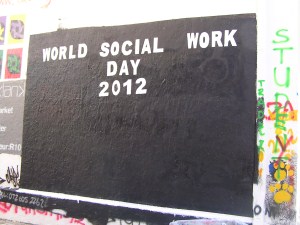
A clean graffiti wall for the commemoration of the World Social Work Day 2012.
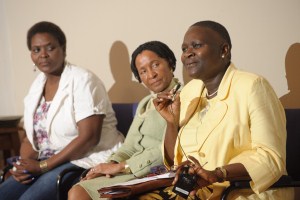
Three guest speakers at World Social Work Day: From left to right is Ms Penny Masiya - a qualified social auxiliary worker who works in the NGO, Future Families. Ms Zanele Mbeki, and Ms Ria Phiyega.
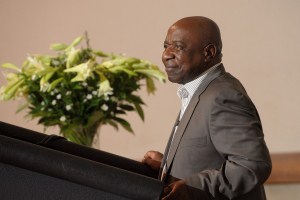
Mr Jackie Mbonani, a representative from the Department of Social Development.
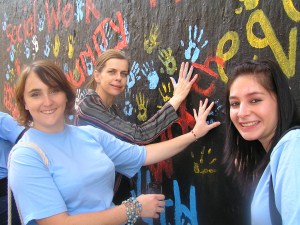
Head of Department of Social Work and Criminology, Prof Antoinette Lombard (centre) with some of the students celebrating the day.
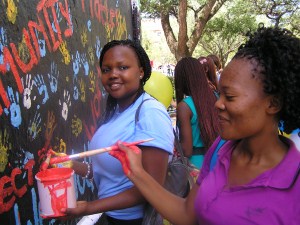
Students making their mark on the day's celebrations.





Get Social With Us
Download the UP Mobile App